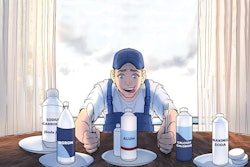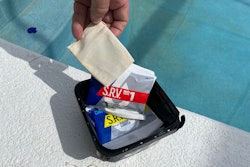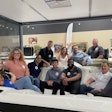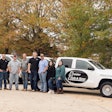Portable pools, whether supported by a framework and straps or not, offer many benefits that consumers are attracted to. Chief among these, according to Jim Newman, vice president of sales and marketing for Splash SuperPools, are durability and the fact that consumers can set them up with little or no help at all, then easily move them should that be necessary.
Some dealers, however, say they've had difficulty selling them alongside traditional steel-walled above-ground pools. One such dealer, Aqualand Pool, Spa & Patio in Bowling Green, Ky., gave it a try and general manager and part owner Jerry Mefford says he had trouble convincing himself and his customers to pay as much for a soft-sided pool as they might for a steel-walled one. On the other hand, many dealers have been very successful, whether selling them exclusively or in addition to their hard-sided counterparts. So what, then, are the keys to successful soft-side pool selling. According to Newman and other dealers and manufacturers, it's all a matter of proper positioning, educating customers about the product's benefits, and, of course, competing against cheaper pools in big box stores.
Here's what the dealers and manufacturers AQUA spoke with have to say about the popular but sometimesmisunderstood product.
Jim Newman, vice president of sales and marketing, Splash SuperPools, North Little Rock, Ark.
How do you respond to someone who says he won't be able to sell soft-sided pools along with steelwalled ones in his dealership?
Newman: The steel-wall pool market is a market that we're specifically targeting to try to get dealers in. Now, I will say that it is difficult for a metalwall dealer to successfully sell one against the other because we have so many features and benefits that are completely contrary to the metal-wall guys. So it ends up that the features and benefits of our pool actually will adversely affect his ability to sell the steel-wall pools. But I think there are some companies, certainly, where it can work together well.
Who's the typical portable pool customer. Is it a different consumer than traditional abovegrounds target?
Newman: When you say 'portable,' I think of those little inflatable ones you buy at Wal-Mart. There really is a difference between the two and I would say that in our industry there's a lot of effort being placed on differentiating between those types of pools. I think people look at the ones that you get from the big retailers as disposable pools. I would say that those types of pools basically compete at the very, very low end of our target market. We view ours as an on-ground pool. I think we compete head to head with the steel-wall guys all the time for the same customer.
How does Splash address safety?
Newman: That's a very, very big issue with us. We have a ladder that was designed specifically for our pool. It actually folds up so it inhibits access to the pool by small children. It's actually connected to the wall, so it moves with the pool wall. Secondly we sell a skimmer that has two points of suction, so the chances of getting trapped is extremely unlikely.
Rob Anderson, president, Poolside, Little Canada, Minn.
What types of portable pools do you sell?
Anderson: We sell KD and Sofpool. The KD ones are supported by frames. Sofpool has the inflated ring around it.
The Sofpool-type, especially, faces competition from cheap lookalikes at places like Wal-Mart. What message do you deliver to your customers about the difference?
Anderson: We just tell people it's a high-end, easy-to-set-up pool that you don't have to take down every winter and is going to last many more years than the one that they just bought for $500 that just fell apart. But for some it's just a money issue. They can look back and say, 'OK, I can buy 10 of these pools for the price of one of yours.' We haven't had a really good answer to get them to purchase at this point.
Are you able to turn some of those price-sensitive shoppers into your customers eventually?
Anderson: Oh, yeah. Absolutely. When people come in and say, 'What do you have under $1,000.' and we say, 'We don't. But if that's what you end up buying certainly keep us in mind, because usually you get limited service with those. If you come back here, we'll tell you how to take care of the water.' We're not going to turn it down just because they bought a pool somewhere else.
Do you have a safety talk before the customer leaves the store?
Anderson: Well, the ones we sell have 48- or 52-inch walls. In most cities those fall within code. The first thing we ask, whether it's in-ground, above-ground or portable pools, is what city they live in and whether they're aware of all codes and setbacks and all those things. Some people are aware and some people have no idea. I'd rather lose a bunch of sales than have people come back and say, 'Well, you didn't tell us this and that and the other thing,' like when they purchase one at a department store.
Dwayne Carreau, vice president, Sofpool, Rancho Cordova, Calif.
How does selling traditional aboveground and your frameless portable pools in the same store work out?
Carreau: I would say that our style of pool, when sold through a traditional above-ground pool store usually is used as a secondary product or is used for sales when the installation crew is too busy to install a traditional above-ground.
How does Sofpool compare price-wise with a steel-walled above-ground?
Carreau: The Sofpool brand is comparatively priced with your tinwall pool with a liner. There are a lot of knockoffs of our product that are very inexpensive, which in turn makes it difficult for some of our dealers to sell our product at times, because consumers can find products that look just like ours at a box store. We really have to sell quality and our dealers are having to educate the consumers to the fact that our product is basically a 20-year product.
The industry has really taken a hard hit from these cheap, junk pools that are being offered in these box stores. They're being sold by people that don't know what they're talking about as far as things like safety issues. They don't have the knowledge or the will or whatever to educate them, and that's causing us lots of problems.
What's the target audience? Is it the same as a steel-walled pool?
Carreau: We consider our product a solid above-ground pool. We've sort of been put into the inflatable pool category, which we really aren't. We have a top collar on our pool that does not really require inflation in order for the pool to stay up. We target the same consumer that buys the other type of above-ground. But we're a lot more portable, so if the person is going to be moving around or if they're renting, it's more convenient for them to buy a structure that you don't have to assemble, really, you just fill it with water. That's one of our main advantages.
What about the safety issue?
Carreau: We have at least 48 inches of water, and the pool itself is about 53 inches tall. We have to explain ourselves, and that gets into an education issue that we really didn't have to deal with in the past. Now it's becoming something that's Q sort of a thorn with the cheap ones causing safety concerns. Our dealers are traditionally either Sofpool only or they're selling the traditional hard-wall pool with a liner and our pool. So these people are basically informed retailers that sell pools for a living; not pools and toasters and household appliances. So they're usually pretty knowledgeable and they do a good job of explaining to people what they need to watch out for, safety precautions you need to take, because that's their business.
Kim Wolter, store manager, Wolter Pool Co., Beloit, Wis.
You sell less-expensive portables that compare with big box offerings. How do you compete?
Wolter: Being a BioGuard dealer, we have had a lot more answers to their questions as far as cloudy water, which seems like a recurring problem with those because the filters are kind of small. So as far as water chemistry and things like that, people will say, 'Oh, get your pool at Wolter's because they know how to take care of it in the aftermarket.' But price is always an issue when you're competing with the big-box store, where they can sell it at a cheaper price just because of the volume. What we also found was that the big-box stores would sell out of everything they had and then the consumer was willing to pay whatever price we had on it, just to get one.
Do por table customers often turn into long-term customers for the store?
Wolter: Sure. If people get in it and use it and like it, then we'll offer them specials — such as money off on an above-ground or help out with the installation — to try to get them to come back and buy another pool from us.
What about safety?
Wolter: There's that fine line because they don't want to fence in the yard for that small pool. By the time someone fences in the yard, they've got a pretty big expense. They might as well go ahead and put in a regular above-ground pool. That's slowed down sales quite a bit.







































